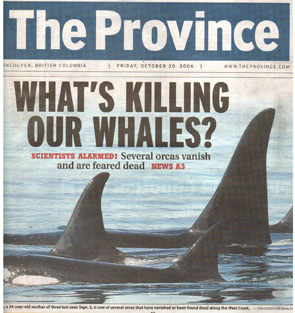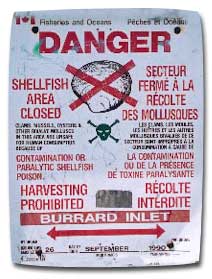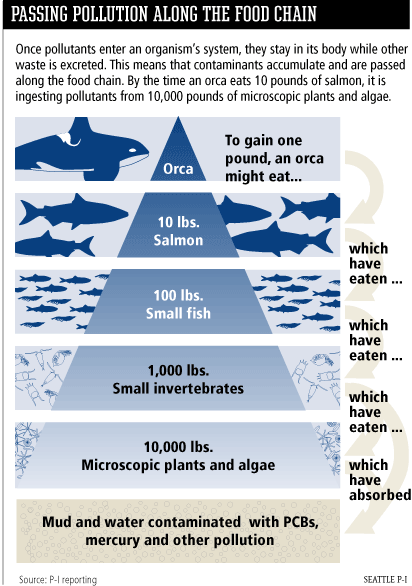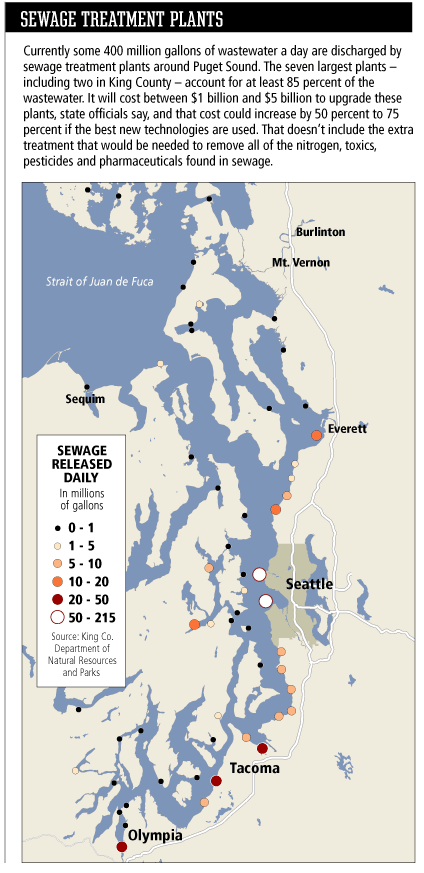What's Killing our whales?
 What’s Killing our whales? The marine life population has been in a massive decline now for decades due to our abuse of our ocean. At the current rate of decline that’s taking place our Killer Whales will be extinct by 2020.
What’s Killing our whales? The marine life population has been in a massive decline now for decades due to our abuse of our ocean. At the current rate of decline that’s taking place our Killer Whales will be extinct by 2020.With two-thirds of BC’s population already living in 3% of the province’s land that makes up the Georgia Basin - and the population continuing to increase rapidly - the region is under incredible stress. Residential, industrial and recreational developments mean loss or degradation of sensitive habitat such as estuaries and wetlands. More than 300 outfalls discharge into the Georgia Basin, carrying pollution from municipal sewage and industrial toxins. Add to this the non-point sources such as urban runoff, septic system failures, oil spills and other sources; the loss of green space to urban sprawl and highways; the degraded air and water quality - all of these are taking a tremendous toll.
Canadians generate an impressive three trillion litres of sewage annually: a mix of water, human waste and the pathogens it can contain (such as cholera, typhoid and hepatitis B), microorganisms, toxic chemicals, heavy metals and excreted pharmaceuticals. The waste threatens drinking water, as well as recreational users, aquaculture and fisheries. “Municipal sewage is the largest source of pollution discharged to surface water bodies in Canada,” warns the Canada Council of Ministers of the Environment, a political group that has finally awakened to the issue. And Environment Canada says, “It is widely recognized that inadequate or no waste water treatment have negative impact on aquatic life, human uses of water, fisheries and human health. Therefore it is unacceptable and shortsighted not to maintain and upgrade infrastructure.
Why then is Canada flushing some 200 billion litres of raw sewage into its waterways every year, enough to fill more than 40,000 Olympic sized swimming pools? It’s a situation the Sierra Legal Defence Fund, which monitors effluent discharge, calls a “national disgrace.”
 We find it utterly disgusting that the Province of British Columbia, Canada cares more about flushing the toilet then it does about life in our oceans.
We find it utterly disgusting that the Province of British Columbia, Canada cares more about flushing the toilet then it does about life in our oceans. Greater Victoria discharge 130 million litres of raw sewage daily into the Strait of Juan de Fuca and Greater Vancouver’s discharges at Iona and Lions Gate are treated only to remove solids. Sewage pollution is toxic to salmon and other fish.
Imagine for a moment that we all stop using our toilet’s and went down to the legislative buildings in Victoria and dumped all our sewage on the front lawn, do you think this would cause a problem? How long would that last? But it’s ok to continue to dump directly into our oceans with zero treatment? Ask yourself who is responsible for the pollution of today? Not the Killer Whale, not the bald eagle, not your pet dog or our children. Let’s face it, it’s you, me and everybody is responsible and there is no escaping it, it’s a fact of life.
Do you not see that we are injecting raw sewage and chemicals directly into food supply chain. Our fish and marine mammals are feasting on our sewage and many other toxic chemicals, it’s no joke as it ends up inside each and every one of us! It’s an open loop!

Industrial pollution

In Greater Vancouver alone, there are more than half a dozen wood product plants, several oil refineries, about 100 food processing plants, almost 50 metal and surface finishing plants and 13 chemical companies discharging wastewater with chemicals toxic to fish into the Greater Vancouver sewage system. Some older pulp mills discharge toxic organochlorine compounds that can cause immune system damage, liver disfunction, impaired reproduction, birth defects and cancer. A target for zero discharge of pulp mill organochlorines by 2002 has now been axed by the provincial government. Waste discharge regulations do not take into account the cumulative impact of the hundreds of toxic waste outfalls flowing directly into the Fraser River, the most important salmon river in Canada.
Municipal sewage

Studies show that typical municipal sewage contains hundreds of toxic chemicals. These toxins are not removed through the minimal sewage treatment most B.C. municipalities employ.
The largest sewage outfall for Greater Vancouver has only primary treatment - settling ponds remove most solids, but the remaining toxic brew goes directly into Georgia Strait. Greater Victoria dumps its sewage raw and untreated into the ocean as do three other coastal municipalities: Tofino, Masset and Prince Rupert.
Sewage dumped in rivers or in the ocean uses up oxygen as it decomposes, suffocating fish at high discharge levels. Deformed oyster and clam shells regularly wash up on beaches near sewage outfalls. Tumours are found on bottom fish near outfalls.
There is increasing evidence that hormones are disrupted by toxins in sewage, affecting juvenile salmon as they acclimatize to salt water. Immune systems are compromised and reproductive systems can be damaged. The side affect of not taking evasive action now is not a pretty vision. It’s a grim outlook but that’s what’s in future if we don’t get our heads out of the sand.
If we can learn to live in symbiosis with Mother Nature as the planet was designed we can control our fate or we can continue our carelessness and our future is limited. Our world is in desparate need for sustainable solutions for waste. Thousands of species are becoming extinct every year and these numbers are rising.
Are we next on the list?
In a simple sense we control our fate, we have been give the freedom to think and to act for a reason and we hope you think about how you can live your life more sustainably, for these reason are not for you alone but for everyone and everything that inhabits this planet and especially the ones who don’t even know, consider yourself lucky as knowledge is power and it’s in our hands to all make a difference because believe it or not we are connected.
The full report on just how bad our sewage issues are can be found by clicking here.
Please invest sustainably and support our local marine charities listed below.
Vancouver Aquarium
http://www.killerwhale.org
http://www.wildwhales.org
World Wild Life
http://www.worldwildlife.org
World Wild Fund
http://www.panda.org
You can return to the main Market News page, or press the Back button on your browser.

